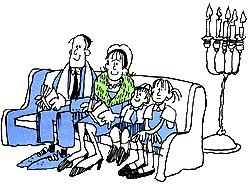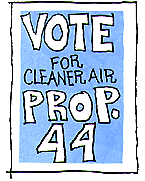We the People: The Citizen and the Constitution
Upper Elementary Grades
Student Book
Purpose of Lesson
Suppose your government does everything it can to protect your rights. Is this enough? Will your rights be protected? Do we have any responsibility to protect not only our own rights, but each other's as well?
In this lesson you will discuss some important questions about the responsibilities of citizens. You must develop your own answers to these questions. We hope this lesson will help you develop good answers.
Is a good constitution enough?
The Framers planned our government carefully. They organized it so its powers were limited. They separated the powers of our government among three different branches. They balanced the powers among these branches. They provided ways each branch could check or limit the powers of the other branches. Finally, they added a Bill of Rights. The Bill of Rights now protects our rights from unfair treatment by our national, state, and local governments.
Some of the Framers believed they had organized the government very well. They believed the way they planned the government was enough to make sure our rights and welfare would be protected.
Other Framers did not agree. They did agree that the way the government was organized was very important. However, they believed that the government would only work well if there were good people running it. They also believed it would only succeed if the citizens were good citizens.
Today, most people agree. A well-written constitution is not enough to protect our rights. We need to elect leaders who will make and enforce laws that protect our rights and promote our welfare.
However, even a good constitution and good leaders may not be enough. If we want to protect our rights and welfare, we, the people, have certain responsibilities to fulfill. Let's examine what some of these responsibilities might be.
What responsibilities go along with our rights?
Most of us agree we all should have certain basic rights. For example, we all want the right to speak freely. We want the right to believe as we wish. We also want to be able to own property and to travel wherever we want to go. Is it fair to say that if we want these rights, we must also take on some responsibilities? Let's examine this question.
Problem solving
Can you have rights without responsibilities?
In the last unit, you studied five of your basic rights. Let's examine what some of the responsibilities might be that go along with these rights. Your class should be divided into five groups. Each group should develop answers to the questions on one of the rights listed below. Then each group should report its findings to the class.

Group 1. Freedom of Expression
Your government cannot unfairly limit your right to speak freely. What responsibilities might go along with this right?
- Suppose you attend a meeting of students in your school. The group is supposed to suggest rules for the playground. You have the right to speak and give your suggestions. What responsibilities should you have in the way you speak and in what you say? List and explain these responsibilities.
- What responsibilities should other students at the meeting have toward your right to speak? List and explain these responsibilities.
- What responsibilities should you have toward the other students' right to speak? List and explain these responsibilities.
- What might happen to the right to free speech if no one fulfilled the responsibilities you have discussed?

Group 2. Freedom of Religion
Your government cannot interfere with your right to believe as you wish. It cannot unfairly limit your right to practice your religious beliefs. What responsibilities might go along with these rights?
- Suppose you believe in a particular religion. You attend a church or temple in your community. List and explain what responsibilities you should have in the way you practice your religious beliefs.
- Suppose there are people in your community who believe in different religions or in no religion at all. List and explain what responsibilities they should have to protect your right to practice your religious beliefs.
- List and explain what responsibilities you should have to protect other people's right to practice their religious beliefs or not to have any religious beliefs.
- What might happen to the right of freedom of religion if no one fulfilled the responsibilities you have discussed?
Group 3. The Right to be Treated Equally
Your government may not favor some people over others because of such things as their age, sex, race, or religion. What responsibilities might go along with this right?
- Suppose people in your community are planning a picnic for the public. List and explain what responsibilities they might have to be fair to you no matter what your age, sex, race, or religion may be.
- Suppose you were helping to plan the picnic. List and explain what responsibilities you think you should have to other people no matter what their age, sex, race, or religion might be.
- What might happen to the right to be treated equally if no one fulfilled the responsibilities you have discussed?

Group 4. The Right to be Treated Fairly by Your Government
Your government must be fair to you when it is gathering information and making decisions. What responsibilities might go along with this right?
- Suppose someone has accused you of doing something wrong in your school or community. What responsibilities should that person have toward you? List and explain those responsibilities.
- Suppose you have accused others of doing something wrong in your school or community. What responsibilities should you have toward them? List and explain those responsibilities.
- What might happen to the right to be treated fairly if no one fulfilled the responsibilities you have discussed?

Group 5. The Right to Vote and Run For Public Office
When you are eighteen, you will have the right to vote. You will also have the right to run for public office if you want to. What responsibilities might go along with this right?
- Suppose you are about to vote in an election. You can vote for or against five proposed laws. You must choose between two people running for Congress. What responsibilities should you have? List and explain those responsibilities.
- Suppose some friends, neighbors, and others in your community do not agree with the way you are going to vote. List and explain what responsibilities they have toward your right to vote.
- Suppose you do not agree with the way some of your friends, neighbors, and others in your community are going to vote. List and explain what responsibilities you should have toward their right to vote.
- What might happen to the right to vote if no one fulfilled the responsibilities you have discussed?
Reviewing and using the lesson
- Explain what you think are some of the most important responsibilities you have in order to protect your rights.
- What responsibilities should you take to protect the rights of others? Why?
ISBN 0-89818-169-0





